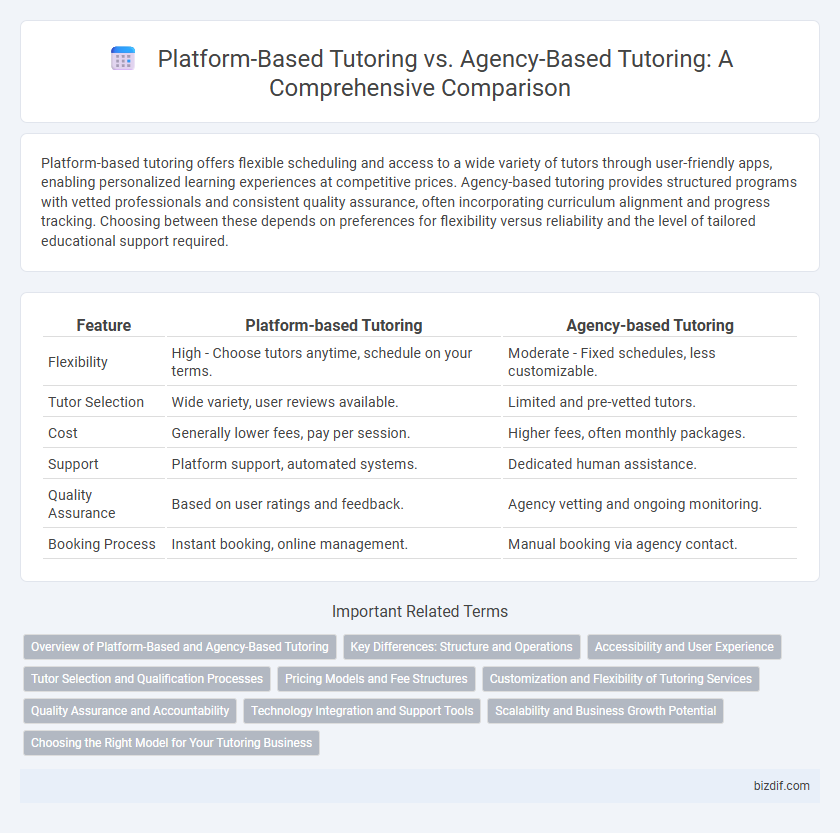Platform-based tutoring offers flexible scheduling and access to a wide variety of tutors through user-friendly apps, enabling personalized learning experiences at competitive prices. Agency-based tutoring provides structured programs with vetted professionals and consistent quality assurance, often incorporating curriculum alignment and progress tracking. Choosing between these depends on preferences for flexibility versus reliability and the level of tailored educational support required.
Table of Comparison
| Feature | Platform-based Tutoring | Agency-based Tutoring |
|---|---|---|
| Flexibility | High - Choose tutors anytime, schedule on your terms. | Moderate - Fixed schedules, less customizable. |
| Tutor Selection | Wide variety, user reviews available. | Limited and pre-vetted tutors. |
| Cost | Generally lower fees, pay per session. | Higher fees, often monthly packages. |
| Support | Platform support, automated systems. | Dedicated human assistance. |
| Quality Assurance | Based on user ratings and feedback. | Agency vetting and ongoing monitoring. |
| Booking Process | Instant booking, online management. | Manual booking via agency contact. |
Overview of Platform-Based and Agency-Based Tutoring
Platform-based tutoring enables direct connections between students and tutors through online interfaces, offering flexible scheduling and a wide variety of subject experts. Agency-based tutoring involves coordinated services from professional organizations that vet tutors, provide structured programs, and often include personalized matching and progress tracking. Both models cater to different needs: platforms emphasize accessibility and tutor diversity, while agencies focus on quality assurance and comprehensive support.
Key Differences: Structure and Operations
Platform-based tutoring operates through digital marketplaces connecting tutors directly with students, emphasizing flexibility and scalability, while agency-based tutoring relies on a centralized model with structured administration and quality control. Platforms typically offer a wide range of subjects with varied pricing and decentralized tutor selection, whereas agencies provide curated tutors, standardized pricing, and consistent service protocols. The operational framework of platform tutoring enables rapid expansion and diverse options, contrasting with the agency model's focus on personalized oversight and institutional reliability.
Accessibility and User Experience
Platform-based tutoring offers greater accessibility with 24/7 online availability and a wide range of tutors from diverse backgrounds, enhancing user convenience. Agency-based tutoring often provides personalized support and vetting processes, ensuring higher tutor quality but may have limited scheduling flexibility. User experience on platforms benefits from intuitive interfaces, while agencies emphasize tailored matching and direct communication with tutors.
Tutor Selection and Qualification Processes
Platform-based tutoring offers direct access to a diverse pool of tutors with detailed profiles, enabling students to independently select tutors based on qualifications, reviews, and specialized subjects. Agency-based tutoring involves a centralized vetting process where agencies pre-screen tutors for certifications, experience, and background checks before matching them with students. The platform model emphasizes transparency and choice, while agencies prioritize curated and quality-assured tutor assignments through standardized qualification processes.
Pricing Models and Fee Structures
Platform-based tutoring often employs a transparent, pay-per-session or subscription pricing model, enabling flexible budget management and direct tutor-student interaction with minimal commission fees. Agency-based tutoring typically involves higher, fixed-rate fees or packages that include administrative costs, offering structured programs and accountability but less price flexibility. The key difference lies in the cost efficiency and customization of platform pricing versus the comprehensive support and stability associated with agency fee structures.
Customization and Flexibility of Tutoring Services
Platform-based tutoring offers highly customizable learning experiences by leveraging adaptive technologies and extensive tutor databases, allowing students to tailor sessions to specific needs and schedules. Agency-based tutoring often provides structured programs with fixed curricula and limited flexibility, focusing on standardized approaches and in-person support. The choice between these models significantly impacts the ability to personalize educational content and adapt timing to individual learning preferences.
Quality Assurance and Accountability
Platform-based tutoring leverages technology to provide transparent quality metrics, real-time feedback, and direct tutor reviews, enhancing accountability and ensuring consistent performance standards. Agency-based tutoring often emphasizes personalized matching and hands-on oversight but may lack the scalable data-driven quality assurance systems found in digital platforms. Both models aim to maintain high educational outcomes, yet platform-based solutions offer more robust tools for tracking tutor effectiveness and student progress.
Technology Integration and Support Tools
Platform-based tutoring leverages advanced technology integration, including AI-driven matching algorithms, interactive virtual classrooms, and real-time progress tracking tools, enhancing personalized learning experiences. Agency-based tutoring often relies on traditional methods with limited technological support, focusing more on in-person or manual coordination between tutors and students. The scalability and efficiency of platform-based tutoring make it superior in delivering adaptive learning environments and continuous support through innovative digital tools.
Scalability and Business Growth Potential
Platform-based tutoring leverages technology to rapidly connect tutors and students, enabling scalable growth with minimal overhead and automated administrative tasks. Agency-based tutoring often relies on manual coordination and local market presence, limiting scalability and hindering rapid business expansion. The data shows platform models can achieve exponential growth by accessing global markets and optimizing resource allocation more efficiently than traditional agencies.
Choosing the Right Model for Your Tutoring Business
Platform-based tutoring offers scalable technology infrastructure, streamlined scheduling, and direct access to diverse student pools, enhancing operational efficiency and market reach. Agency-based tutoring provides personalized brand management, dedicated administrative support, and pre-vetted tutors, ensuring higher quality control and client trust. Selecting the right model depends on business goals, such as prioritizing growth through technology or emphasizing bespoke service quality and client relationships.
Platform-based Tutoring vs Agency-based Tutoring Infographic

 bizdif.com
bizdif.com